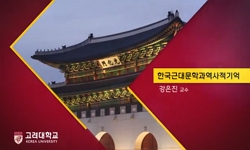Gyeongwa Eom Myeong-seop was one of the intellectuals during the Japanese rule. He was also a Dohak scholar that kept the Confucian ideology and value right into the modern days. His consciousness of worries over the troubled world during the transiti...
http://chineseinput.net/에서 pinyin(병음)방식으로 중국어를 변환할 수 있습니다.
변환된 중국어를 복사하여 사용하시면 됩니다.
- 中文 을 입력하시려면 zhongwen을 입력하시고 space를누르시면됩니다.
- 北京 을 입력하시려면 beijing을 입력하시고 space를 누르시면 됩니다.

敬窩의 憂患意識과 修己復禮 = Gyeongwa's Consciousness of Worries over the Troubled World and Spirit of Restoring the Universal Human Order through Self-Cultivation
한글로보기부가정보
다국어 초록 (Multilingual Abstract)
Gyeongwa Eom Myeong-seop was one of the intellectuals during the Japanese rule. He was also a Dohak scholar that kept the Confucian ideology and value right into the modern days. His consciousness of worries over the troubled world during the transition of times can be examined in two aspects of "study of Confucian ways" and "education." The study examined Gyeongwa's consciousness of worries over the troubled world based on his Chinese poems: first, there was the severance of the traditional Confucian ways. Secondly, his consciousness of worries over the troubled world was rooted in the decline of the Confucian tradition. Trying to fulfill his sense of duty to bring up Confucian successors, he devoted his entire life to education and encouraged younger students to study diligently. His most prominent viewpoint of education was "cultivating oneself(修己)." This was to restore one's own human nature and in line with the Neo-Confucian thinking that "The human nature is logic." Such a voluntary and active academic attitude was the most desperate one for Confucian scholars in his days. In cultivation, the emphasis was on "reverent mind and careful action(敬)," "truthful with no lies(誠)," "careful" and "hard working." Gyeongwa took ‘敬’ as his criterion of study and life.
참고문헌 (Reference)
1 "論語"
2 최명표, "전북작가열전" 신아출판사 2018
3 선종순, "금재문집 1・2" 전라북도・전주시・한국고전문화연구원 2018
4 嚴命涉, "舜山日記 複印本"
5 李光洙, "民族改造論" 1922
6 崔秉心, "欽齋文集"
7 辛日鎔, "春園의 民族改造論을 평함" 1922
8 嚴命涉, "敬窩私稿 上・下 影印本"
9 이은혁, "敬窩 嚴命涉의 學問과 艮齋思想의 理解" 한국한문고전학회 33 (33): 383-412, 2016
10 "孟子"
1 "論語"
2 최명표, "전북작가열전" 신아출판사 2018
3 선종순, "금재문집 1・2" 전라북도・전주시・한국고전문화연구원 2018
4 嚴命涉, "舜山日記 複印本"
5 李光洙, "民族改造論" 1922
6 崔秉心, "欽齋文集"
7 辛日鎔, "春園의 民族改造論을 평함" 1922
8 嚴命涉, "敬窩私稿 上・下 影印本"
9 이은혁, "敬窩 嚴命涉의 學問과 艮齋思想의 理解" 한국한문고전학회 33 (33): 383-412, 2016
10 "孟子"
11 "大學"
12 "周易"
13 "中庸"
동일학술지(권/호) 다른 논문
-
- 한서대학교 동양고전연구소
- 장경희
- 2020
- KCI등재
-
- 한서대학교 동양고전연구소
- 이경미
- 2020
- KCI등재
-
역사 ‘기록’과 영웅 ‘출현’의 관계: 신채호의 《을지문덕》 저술을 중심으로
- 한서대학교 동양고전연구소
- 김수자
- 2020
- KCI등재
-
- 한서대학교 동양고전연구소
- 최정선
- 2020
- KCI등재
분석정보
인용정보 인용지수 설명보기
학술지 이력
| 연월일 | 이력구분 | 이력상세 | 등재구분 |
|---|---|---|---|
| 2027 | 평가예정 | 재인증평가 신청대상 (재인증) | |
| 2021-01-01 | 평가 | 등재학술지 유지 (재인증) |  |
| 2018-01-01 | 평가 | 등재학술지 선정 (계속평가) |  |
| 2017-12-01 | 평가 | 등재후보로 하락 (계속평가) |  |
| 2015-06-25 | 학회명변경 | 영문명 : Tongyang Kojon yonguso of HANSEO UNIVERSITY -> INSTITUTE FOR EASTERN CLASSIC STUDIES |  |
| 2013-01-01 | 평가 | 등재 1차 FAIL (등재유지) |  |
| 2010-01-01 | 평가 | 등재학술지 선정 (등재후보2차) |  |
| 2009-01-01 | 평가 | 등재후보 1차 PASS (등재후보1차) |  |
| 2007-01-01 | 평가 | 등재후보학술지 선정 (신규평가) |  |
학술지 인용정보
| 기준연도 | WOS-KCI 통합IF(2년) | KCIF(2년) | KCIF(3년) |
|---|---|---|---|
| 2016 | 0.54 | 0.54 | 0.6 |
| KCIF(4년) | KCIF(5년) | 중심성지수(3년) | 즉시성지수 |
| 0.54 | 0.52 | 1.407 | 0.35 |




 KCI
KCI eArticle
eArticle



